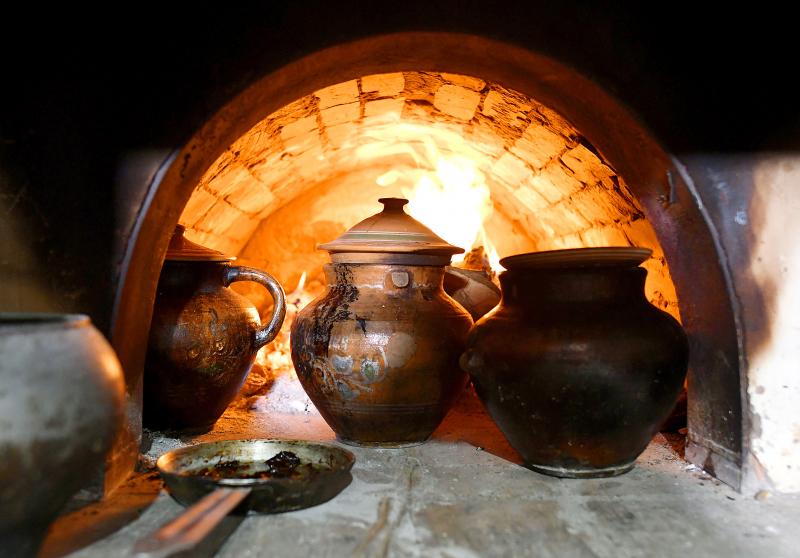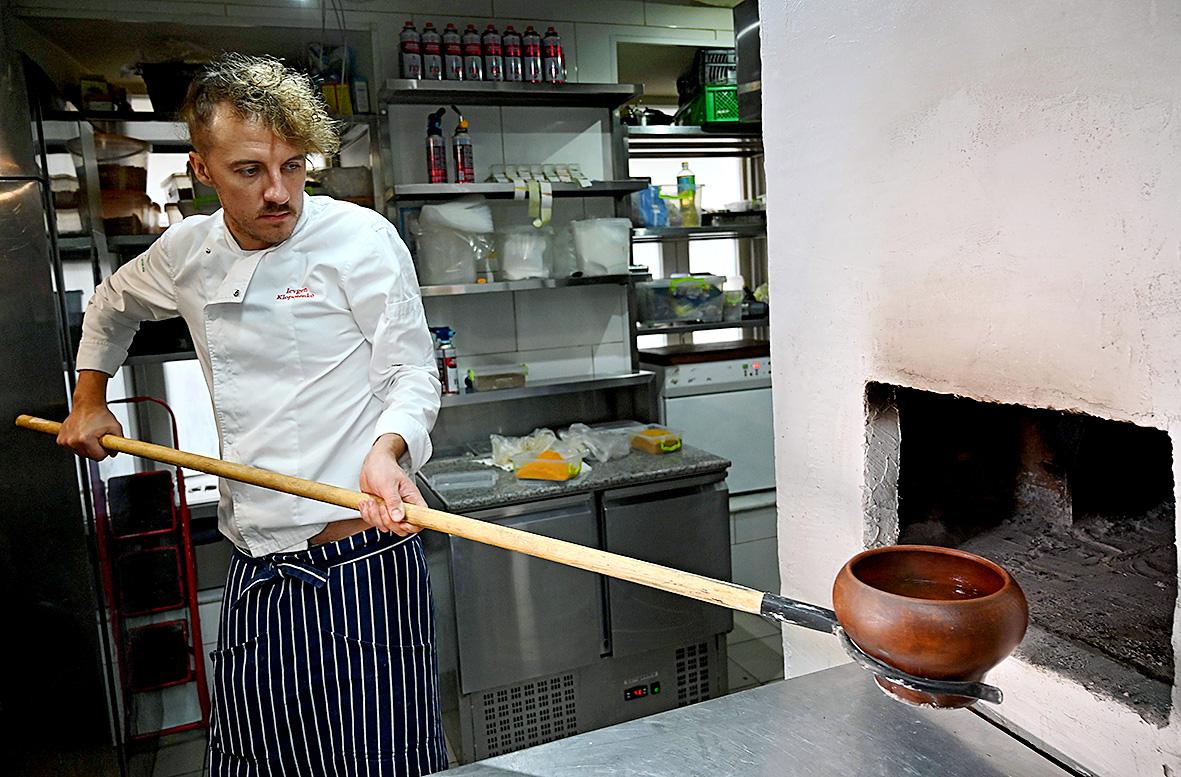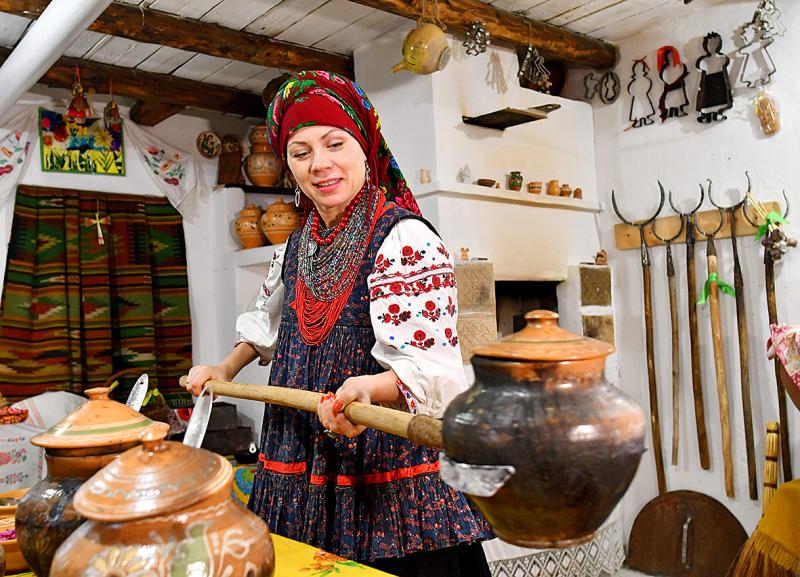Ukrainian chef Ievgen Klopotenko never expected to find himself at the center of the conflict between Russia and Ukraine. But that’s just what happened when the 33-year-old pushed to have borscht — the traditional beetroot and cabbage dish — recognized as part of Ukraine’s historical heritage.
“I don’t really like to call it a war for borscht, but in fact that’s what it is,” Klopotenko, a graduate of the Le Cordon Bleu culinary school, said in his renowned Ukrainian restaurant in central Kiev.
The chef said he was fed up with how restaurants around the world — including those serving “so-called Ukrainian cuisine” — were referring to borscht as Russian soup.

Photo: AFP
So last month he brought a pot of borscht to Ukraine’s culture ministry to convince officials to submit an application to the UN cultural body UNESCO to list borscht as an intangible part of the country’s cultural heritage.
The list already includes French gastronomy, Neapolitan pizza and Georgian wine.
The ministry agreed and said it was preparing the application to UNESCO before the March deadline, so it can be examined in December next year.

Photo: AFP
And suddenly Moscow bristled.
“Borscht is a national food of many countries, including Russia, Belarus, Ukraine, Poland, Romania, Moldova and Lithuania,” Russia’s embassy in the US posted on Twitter.
BORSCHT UNITES US

Photo: AFP
The Russian government soon followed on its own Twitter account, calling borscht “one of Russia’s most famous and beloved dishes and a symbol of traditional cuisine.”
Ukrainians claim that borscht was first mentioned in 1548 in the diary of a European traveler who tasted the soup in a market near Kiev. They say it arrived in Russia much later with Ukrainian settlers.
Tensions between Kiev and Moscow have flared in the decades following the break-up of the Soviet Union in 1991.
After a pro-Western popular uprising in Kiev in 2014 followed by Russia’s annexation of Crimea and support of separatists in the east, the confrontation has intensified.
For Klopotenko, the battle over borscht is really about Ukraine’s identity.
The country has been closely tied to Russia for most of its history. Much of what is now Ukraine was part of the tsarist Russian empire and later the country became part of the Soviet Union. “When I started studying Ukrainian food and cuisine, I realized that Ukrainian cuisine does not exist in Ukraine. It’s all Soviet,” Klopotenko said.
The Soviet Union “swallowed” Ukraine, “chewed it and spat it out ... We don’t know who we are or what we are,” he added.
But there is one thing for Klopotenko that is quintessentially Ukrainian: the beetroot and cabbage soup. “I realized that borscht is what unites us,” he said. “We may be different, we eat different types of borscht cooked to different recipes, but it’s borscht.”
MORE THAN FOOD
The application will not contain a recipe for borscht as “nobody knows the authentic one,” Klopotenko said.
“We will register something bigger. We will register the culture of borscht in Ukraine,” he said, adding that the soup “is much more important than just food.”
Olena Shcherban, a Ukrainian ethnologist and historian, said it is “absurd” to associate borscht with Russia.
“Borscht is the second dish that I ate after my mother’s milk. We wean the baby and then feed him with borscht,” Shcherban said as she stood over her stove cooking the soup.
The 40-year-old says that Ukrainians do not know their history well and have a “lack of pride” in their gastronomy, unlike the French or Italians.
She has tried to promote the dish through a festival in the village of Opishnya in central Ukraine that she has organized for seven years. And last month, she opened a museum dedicated to borscht.
“Borscht is art, borscht is language, borscht is culture, borscht is the history of my Ukraine,” Shcherban said.

This year will go down in the history books. Taiwan faces enormous turmoil and uncertainty in the coming months. Which political parties are in a good position to handle big changes? All of the main parties are beset with challenges. Taking stock, this column examined the Taiwan People’s Party (TPP) (“Huang Kuo-chang’s choking the life out of the TPP,” May 28, page 12), the Democratic Progressive Party (DPP) (“Challenges amid choppy waters for the DPP,” June 14, page 12) and the Chinese Nationalist Party (KMT) (“KMT struggles to seize opportunities as ‘interesting times’ loom,” June 20, page 11). Times like these can

June 23 to June 29 After capturing the walled city of Hsinchu on June 22, 1895, the Japanese hoped to quickly push south and seize control of Taiwan’s entire west coast — but their advance was stalled for more than a month. Not only did local Hakka fighters continue to cause them headaches, resistance forces even attempted to retake the city three times. “We had planned to occupy Anping (Tainan) and Takao (Kaohsiung) as soon as possible, but ever since we took Hsinchu, nearby bandits proclaiming to be ‘righteous people’ (義民) have been destroying train tracks and electrical cables, and gathering in villages

Dr. Y. Tony Yang, Associate Dean of Health Policy and Population Science at George Washington University, argued last week in a piece for the Taipei Times about former president Ma Ying-jeou (馬英九) leading a student delegation to the People’s Republic of China (PRC) that, “The real question is not whether Ma’s visit helps or hurts Taiwan — it is why Taiwan lacks a sophisticated, multi-track approach to one of the most complex geopolitical relationships in the world” (“Ma’s Visit, DPP’s Blind Spot,” June 18, page 8). Yang contends that the Democratic Progressive Party (DPP) has a blind spot: “By treating any

Swooping low over the banks of a Nile River tributary, an aid flight run by retired American military officers released a stream of food-stuffed sacks over a town emptied by fighting in South Sudan, a country wracked by conflict. Last week’s air drop was the latest in a controversial development — private contracting firms led by former US intelligence officers and military veterans delivering aid to some of the world’s deadliest conflict zones, in operations organized with governments that are combatants in the conflicts. The moves are roiling the global aid community, which warns of a more militarized, politicized and profit-seeking trend